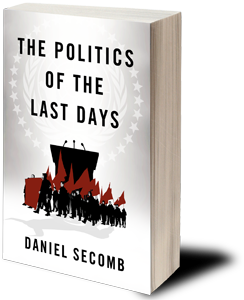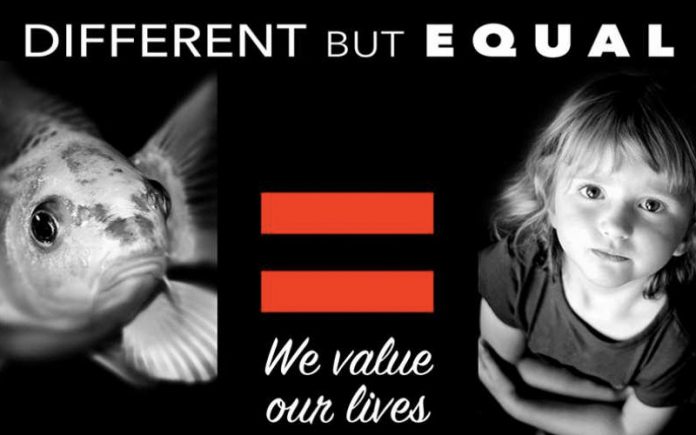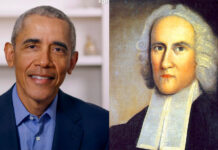The concept of “consensus” is used to strong-arm the public into accepting climate change, or gay rights, or transgender bathrooms, or evolution, or the safety of genetically-modified foods, or global warming. Given the power of the consensus on these issues, don’t we need a consensus on whether human beings are radically different from animals?
Because, to judge from a world-wide advertising campaign, a good number of people do not believe that we are.
For four weeks in August and September last year, a gigantic billboard campaign in Times Square in New York promoted veganism – the idea that we should live without animal products of any kind, for cosmetics, footwear, research, entertainment and especially food. The key message was “different but equal” – that animals have exactly the same feelings and relationships as human beings do.
Actor Joaquin Phoenix said that the campaign, “encourages us to consider that our core similarities are far deeper than our surface differences. Now, more than ever, the world needs to hear this message.”
Why now more than ever? When thousands of innocent civilians are dying in wars in central Africa, or drowning in the Mediterranean, or being bombed in Syria, why now more than ever do we need to protect cute-looking animals?
The campaign, run by a vegan outfit called Be Fair Be Vegan has now moved from the Big Apple to the Apple Isle, the Australian state of Tasmania. Once again, the images on billboards in Hobart, the state’s capital, are starkly beautiful in black and white. Many people, especially young students, might find them persuasive.
“They value their lives like we do… we play … we grieve … we wonder … we feel … we are aware … we think … we value our lives … we raise families …”
Knowing what animals “think” or “feel” is a notoriously difficult philosophical problem. But it is nothing like human capacity for reasoning. The sheep, turkeys, calves and pigs on the billboards cannot visualise the future, compose music, decide to diet, add 2+2, or lobby for the rights of endangered species.
Protecting animals from brutal treatment in abattoirs or battery farms is not the point. One can support animal welfare without believing that Madagascar is a documentary and not a fantasy. We don’t have to accept cruelty as the price for believing that there is an essential difference between humans and animals.
Paradoxically, the “argument”, such as it is, of the billboards is that if animals look like human beings, they are honorary humans. But where does that leave animals who don’t look like humans? A squid? A rattlesnake? A tarantula? Why aren’t they on the billboards?
Actually one of them is. “Different but equal” are the words at the top of the billboard. Below them are images of a goldfish and a girl aged about three with a huge red equals sign between them. “We value our lives” is the slogan.
Tell me, would you allow the person who created that billboard to babysit your 3-year-old daughter? If she thinks that the life of a child and the life of a goldfish are of equal value, could she be trusted to save the toddler if there is a fire? Mightn’t she empty the fish tank first?
The fact is that people who think that animals should be treated with all the respect and tenderness due to human beings will end up treating human beings like animals.
Source: MercatorNet
 Register your interest for Daniel Secomb's new book, "Politics of the Last Days"
Register your interest for Daniel Secomb's new book, "Politics of the Last Days"
Daniel's new book explores the integral and fascinating role that politics will play in the end times.
He demonstrates that political philosophy is actually underpinned by biblcal principles and that by examining the political history of the past can give us a fascinating glimpse into how Biblical end times events will unfold.
Be sure to sign up with your name and email address to be notified of updates and the upcoming release date of the book.


















